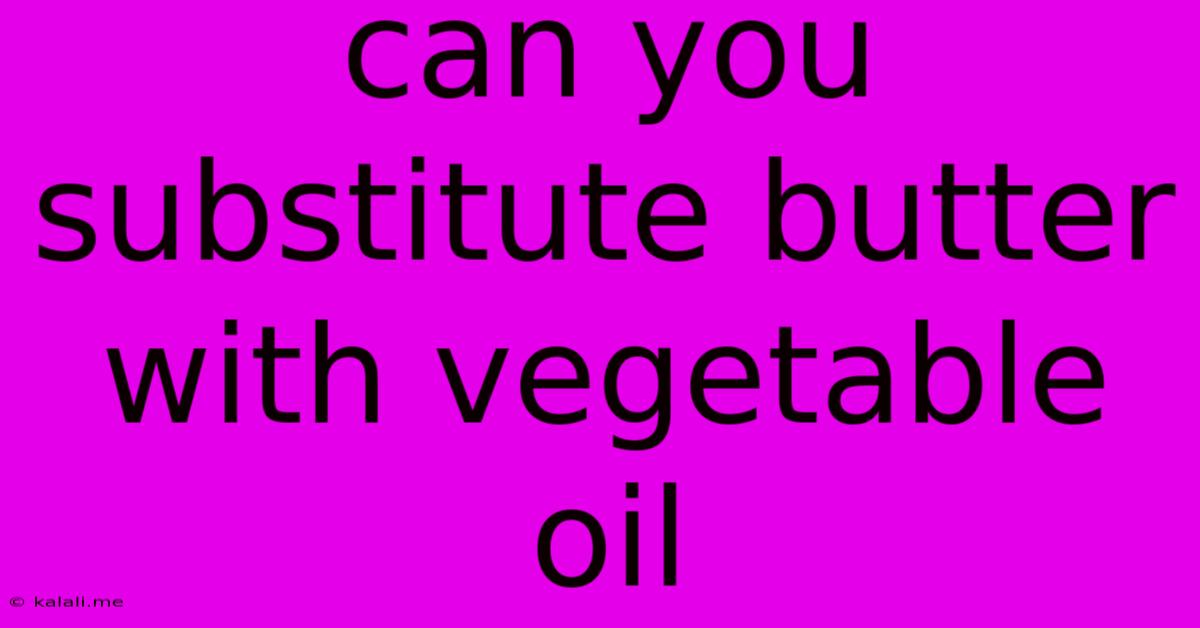Can You Substitute Butter With Vegetable Oil
Kalali
May 26, 2025 · 3 min read

Table of Contents
Can You Substitute Butter With Vegetable Oil? A Comprehensive Guide
Can you swap butter for vegetable oil in baking and cooking? The short answer is: sometimes, but with caveats. While they're both fats, butter and vegetable oil have vastly different properties that affect the final outcome of your culinary creations. This article explores the nuances of butter versus vegetable oil substitution, helping you decide when a swap is feasible and when it's best to stick with the original recipe.
Understanding the Differences: Butter vs. Vegetable Oil
Butter, a dairy product, is comprised of fat, water, and milk solids. These milk solids contribute to butter's unique flavor, color, and texture, and they play a crucial role in baking, impacting browning, tenderness, and richness. The water content in butter also influences the overall consistency of baked goods.
Vegetable oil, on the other hand, is a pure fat extracted from plants. It lacks the water and milk solids found in butter, resulting in a neutral flavor and a higher smoke point. This means vegetable oil is better suited for high-heat cooking methods. The absence of water also affects how it interacts with other ingredients in recipes.
When Vegetable Oil Can Be a Suitable Substitute for Butter
-
High-Heat Cooking: Vegetable oil's higher smoke point makes it the better choice for frying, sautéing, or stir-frying. Butter burns easily at high temperatures, imparting a bitter taste and potentially creating harmful compounds. Substituting vegetable oil in these scenarios is not only acceptable but recommended.
-
Certain Baking Recipes: Some recipes, especially those that rely less on butter's contribution to texture and flavor, can tolerate a substitution. For instance, quick breads or muffins might not be significantly altered by using vegetable oil instead of butter. However, the result might be a slightly less tender or flavorful end product.
-
Recipes Calling for Melted Butter: When a recipe calls for melted butter, vegetable oil can often be used as a direct replacement, maintaining a similar level of moisture. This works particularly well in recipes where the butter's flavor isn't a primary component.
When Vegetable Oil is NOT a Suitable Substitute for Butter
-
Recipes Relying on Butter's Texture and Flavor: Cakes, cookies, and pastries often depend on butter's fat content and milk solids for their texture, tenderness, and characteristic flavor. Substituting vegetable oil can result in a dry, crumbly, or less flavorful outcome. The richness and mouthfeel will be noticeably different.
-
Recipes Requiring Creaming Butter and Sugar: The process of creaming butter and sugar incorporates air into the mixture, creating a light and fluffy texture. Vegetable oil doesn't create the same air pockets, leading to a denser final product.
-
Pie Crusts and Pastries: Butter's fat content is crucial for creating flaky and tender pie crusts and pastries. The substitution with vegetable oil will almost certainly result in a tough and less desirable texture.
Tips for Successful Substitution (When Possible)
-
Reduce the Amount: Since vegetable oil lacks water, you might need to reduce the amount slightly to avoid an overly oily result. Start by using about ¾ of the amount of oil called for in the butter measurement.
-
Adjust Other Ingredients: You may need to adjust other ingredients, such as baking powder or liquid, to compensate for the change in fat content.
-
Experiment Gradually: If you're unsure, start by substituting a small portion of the butter with vegetable oil to see how it affects the final product.
Conclusion
While vegetable oil can sometimes substitute for butter, it's essential to understand the differences in their properties. Choose wisely based on the recipe and the desired outcome. High-heat cooking benefits from the substitution, but baking frequently requires butter's unique characteristics for optimal results. Consider carefully the recipe's reliance on butter's flavor and texture before making a swap. Remember, experimenting is key, but always start with caution and adapt accordingly.
Latest Posts
Latest Posts
-
The Implicit Constant The Implied Constant
May 27, 2025
-
What Will Super Glue Not Stick To
May 27, 2025
-
Fire Alarm Went Off Then Stopped
May 27, 2025
-
How To Turn Off Tips In Java
May 27, 2025
-
How To Use Embeded Keys With Nginx
May 27, 2025
Related Post
Thank you for visiting our website which covers about Can You Substitute Butter With Vegetable Oil . We hope the information provided has been useful to you. Feel free to contact us if you have any questions or need further assistance. See you next time and don't miss to bookmark.